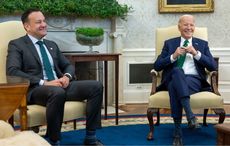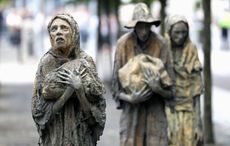Introduced by Irish Ambassador Anne Anderson at the annual Irish America Hall of Fame event Clinton delivered the keynote address and referred to a very rare copy of the Easter 1916 proclamation which was loaned to the event by the American Irish Historical Society.
The event also saw the induction of four of Irish America’s greatest leaders from the military, the arts, and philanthropic sectors – Col. Eileen Collins, the first female space shuttle commander; former chairman of the Joint Chiefs of Staff Gen. Martin E. Dempsey, essayist, novelist, reporter, and columnist Pete Hamill; and Edward J.T. Kenney, who was being honored for his role in the Peace Process and his work with the Irish relief organization Concern Worldwide U.S
Speaking of the proclamation Clinton stated it was “a document that says that Ireland will be established for all people who believe in freedom in constitutional government without regard for their religion or their race or background.
“In other words, it calls for what we have been working for for the last 20 years and what the Irish have largely achieved through great difficulties. And the only thing that works in an interdependent world [are] inclusive economics, inclusive societies, inclusive governments. Nothing else over the long run is sustainable.”
Threading together the legacy of the message of female inclusion in the 1916 Proclamation with the poetry of W.B. Yeats, his experiences with the peace process in Northern Ireland, and contemporary questions of the global rise of right-wing nationalism he stated:
“I think the lessons of 1916 teach us a lot about what’s happening all across the world in 2016,” he said.
Quoting Yeats’s “The Second Coming,” Clinton said, “If things fall apart, the center cannot hold. If the center does not hold, inclusive economics, inclusive societies, and inclusive governance all fall to the politics of blame.”
“It’s too easy to believe that the solution to the modern world is to hunker down,” he said. “It’s easy to turn away, but it’s better to go forward, because the enemies of freedom, the people who don’t really believe in diversity, they will always find a way to pierce the walls. So we need a stronger fence; we need stronger diplomacy. But we also need never to lose our willingness to reach across the barriers. And that is the great test.
“We are so close, ironically, in this country, to being back to the point where we can all go together again. We are much more likely to live together again – this year’s St. Patrick’s Day Parade for instance.
“But our great vice seems to be, having shed so much of our bigotry, we just don’t want to be around anybody who disagrees with us anymore. This is a problem in both parties – ‘There’s something wrong with you if you don’t see it my way.’
“Just remember, the Northern Ireland Agreement, the Good Friday Accord, institutionalized inclusive governance, a special relationship with both the United Kingdom and the Irish republic, a way forward for inclusive prosperity, for inclusive politics.
“We can never let our hearts turn to stone,” he said, in another Yeats reference to “Easter 1916.” “And we can never let things fall apart so much that we cannot build a dynamic center where the future of our children counts more than the scars of our past. That is the ultimate lesson of every single thing that has happened from 100 years ago when that declaration was issued, down to all that has happened since 1995. And I hope you will be the torchbearers for that message of hope.”
In her introduction Ambassador Anderson stated “Today, we are honoring the former president’s central and catalytic role in the peace process in Northern Ireland. But in a world so fraught with strife and instability, we are also recognizing the qualities that are at the very heart of peacemaking and peacebuilding. She went on to highlight his leadership, engagement and persistence in dealing with the Troubles, and singling him out for visiting Northern Ireland three separate times during his presidency.
“No one who witnessed those extraordinary scenes in Belfast and Derry will ever forget them – the switching on of the Christmas tree lights, the bonding of the huge crowds, communicating so urgently belief in a better future,” she said.
“No recipient could be more deserving of a lifetime achievement award. And it is all the more resonant and meaningful for being conferred in this momentous year as we commemorate the centenary of 1916. The themes of commemoration – remember, reconcile, reimagine – are ones that chime precisely with Bill Clinton’s own involvement on our island.”




Comments